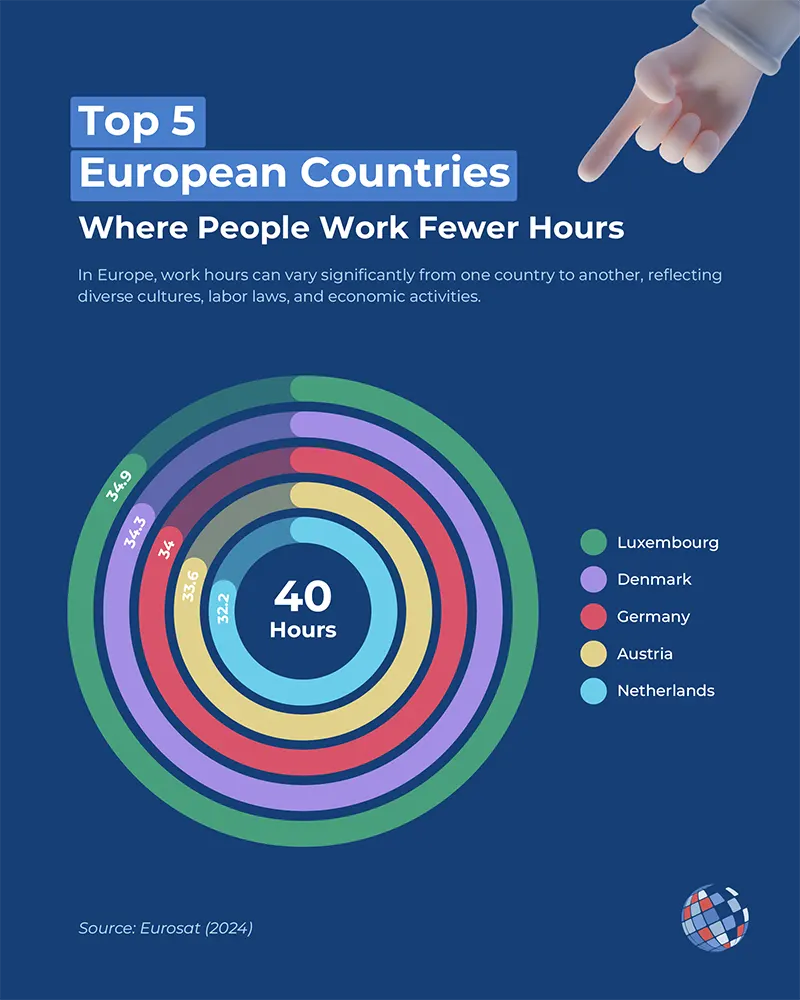Understanding the average work hours in different countries can provide valuable insights into work-life balance and economic conditions. In Europe, work hours can vary significantly from one country to another, reflecting diverse cultures, labor laws, and economic activities.
This article explores the top European countries where people work the least amount of hours. By examining these countries, we can gain a better understanding of the factors that contribute to shorter work weeks and how businesses and professionals can benefit from these working conditions.

Tired of scrolling? Download a PDF version for easier offline reading and sharing with coworkers
Average Work Time in the EU in 2024
In 2023, the average weekly working hours for people aged 20-64 in their main job across the European Union (EU) was 36.1 hours. This figure represents a balance between countries with longer working hours and those with shorter working weeks.
The variation in work hours across the EU is influenced by factors such as economic activities, cultural attitudes towards work, and national labor regulations. For instance, countries with strong social welfare systems and a focus on work-life balance tend to have shorter average work weeks. This diversity in work hours provides a rich landscape for analyzing how different countries manage their labor forces.

5. Luxembourg (34.9 Hours)
Luxembourg stands out with an average working week of 34.9 hours. Known for its robust financial sector, including banking, insurance, and investment funds, Luxembourg boasts a GDP of approximately $84 billion.
With an impressively low unemployment rate of around 5% in 2024, Luxembourg continues to showcase strong economic performance. Fintech and green finance are key growth sectors, bolstered by progressive regulations and a highly skilled international workforce. The strategic location and business-friendly policies of Luxembourg make it an attractive destination for businesses looking to expand their European operations.
Learn more about expanding into Luxembourg with our in-depth EOR guide.
4. Denmark (34.3 Hours)
Denmark, emphasizing work-life balance, averages 34.3 work hours per week. Its economy thrives on a strong service sector, manufacturing, and renewable energy industries, contributing to a GDP of about $397 billion.
In 2024, Denmark’s unemployment rate is projected to be a low 4.5%, reflecting economic stability and a healthy job market. Biotechnology and pharmaceuticals are emerging as significant growth sectors, driven by cutting-edge research and substantial investments. Denmark’s supportive business environment and focus on innovation position it as an ideal hub for companies aiming to penetrate the European market.
Learn more about expanding into Denmark with our in-depth EOR guide.
3. Germany (34 Hours)
Germany, Europe’s economic giant, reports an average working week of 34.0 hours. Renowned for its engineering and manufacturing prowess, Germany’s key industries include automotive production, machinery, and chemicals, contributing to a staggering GDP of $4.3 trillion. The unemployment rate in Germany for 2024 is expected to remain low at 3.8%, thanks to its strong industrial base and export-oriented economy.
Growth in digital technology and renewable energy sectors is significant, supported by substantial government funding and a skilled workforce. Germany’s efficient labor market and commitment to innovation create a favorable environment for both domestic and international businesses.
Learn more about expanding into Germany with our in-depth EOR guide.
2. Austria (33.6 Hours)
Austria is celebrated for its scenic landscapes and high quality of life, with an average working week of 33.6 hours. The Austrian economy, driven by industries such as machinery, metallurgical products, and chemicals, boasts a GDP of approximately $480 billion. In 2024, Austria’s unemployment rate is expected to be around 6.1%, reflecting a stable job market.
Renewable energy and information technology are key growth sectors, propelled by government initiatives and investments in sustainable development. Austria’s commitment to innovation and sustainability makes it an appealing destination for businesses considering European expansion.
Learn more about expanding into Austria with our in-depth EOR guide.
1. Netherlands (32.2 Hours)
The Netherlands leads with the shortest average work week of 32.2 hours. Known for its liberal policies and thriving economy, the Netherlands excels in sectors such as technology, agriculture, and finance, contributing to a GDP of about $1 trillion.
The country’s unemployment rate in 2024 is expected to remain low at 3.6%, supported by its innovative and export-oriented economy. Biotechnology and clean energy are the prominent industries for growth, driven by a strong focus on sustainability and research excellence. The Netherlands’ favorable business climate and emphasis on innovation make it an attractive destination for international businesses.
Learn more about expanding into the Netherlands with our in-depth EOR guide.
Expand into Europe with INS Global
Expanding your business into Europe can be a strategic move to tap into new markets and access a diverse talent pool. INS Global offers comprehensive Employer of Record (EOR) services that simplify international hiring and ensure compliance with local labor laws.
By partnering with INS Global, businesses can efficiently manage payroll, taxes, benefits, and regulatory compliance, allowing them to focus on core business activities. Our expertise in navigating the complexities of different European markets ensures a smooth and successful expansion process.
Discover the benefits of working with INS Global and take the first step towards expanding your business into Europe today.

SHARE